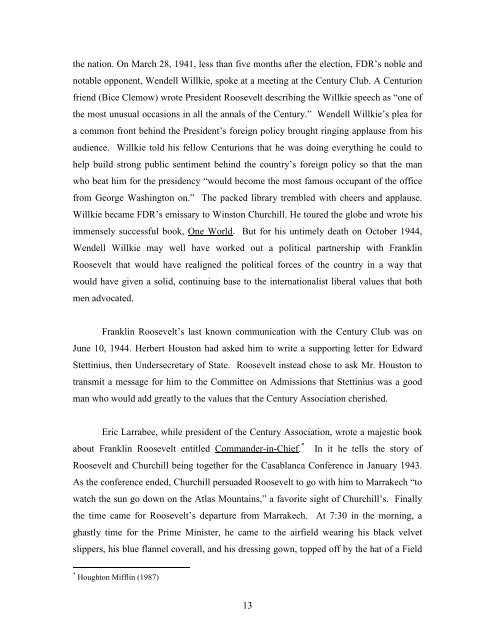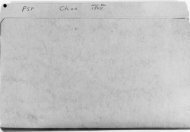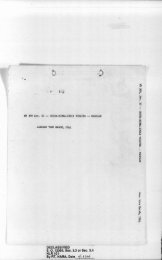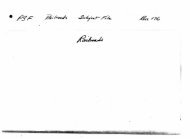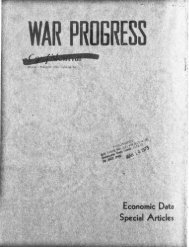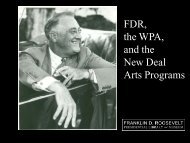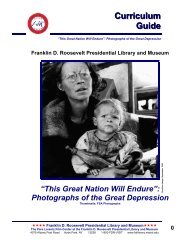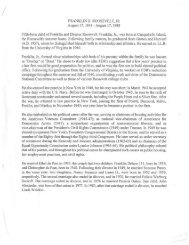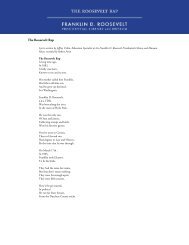Franklin Delano Roosevelt A Man of the Century
Franklin Delano Roosevelt A Man of the Century
Franklin Delano Roosevelt A Man of the Century
You also want an ePaper? Increase the reach of your titles
YUMPU automatically turns print PDFs into web optimized ePapers that Google loves.
<strong>the</strong> nation. On March 28, 1941, less than five months after <strong>the</strong> election, FDR’s noble and<br />
notable opponent, Wendell Willkie, spoke at a meeting at <strong>the</strong> <strong>Century</strong> Club. A Centurion<br />
friend (Bice Clemow) wrote President <strong>Roosevelt</strong> describing <strong>the</strong> Willkie speech as “one <strong>of</strong><br />
<strong>the</strong> most unusual occasions in all <strong>the</strong> annals <strong>of</strong> <strong>the</strong> <strong>Century</strong>.” Wendell Willkie’s plea for<br />
a common front behind <strong>the</strong> President’s foreign policy brought ringing applause from his<br />
audience. Willkie told his fellow Centurions that he was doing everything he could to<br />
help build strong public sentiment behind <strong>the</strong> country’s foreign policy so that <strong>the</strong> man<br />
who beat him for <strong>the</strong> presidency “would become <strong>the</strong> most famous occupant <strong>of</strong> <strong>the</strong> <strong>of</strong>fice<br />
from George Washington on.” The packed library trembled with cheers and applause.<br />
Willkie became FDR’s emissary to Winston Churchill. He toured <strong>the</strong> globe and wrote his<br />
immensely successful book, One World. But for his untimely death on October 1944,<br />
Wendell Willkie may well have worked out a political partnership with <strong>Franklin</strong><br />
<strong>Roosevelt</strong> that would have realigned <strong>the</strong> political forces <strong>of</strong> <strong>the</strong> country in a way that<br />
would have given a solid, continuing base to <strong>the</strong> internationalist liberal values that both<br />
men advocated.<br />
<strong>Franklin</strong> <strong>Roosevelt</strong>’s last known communication with <strong>the</strong> <strong>Century</strong> Club was on<br />
June 10, 1944. Herbert Houston had asked him to write a supporting letter for Edward<br />
Stettinius, <strong>the</strong>n Undersecretary <strong>of</strong> State. <strong>Roosevelt</strong> instead chose to ask Mr. Houston to<br />
transmit a message for him to <strong>the</strong> Committee on Admissions that Stettinius was a good<br />
man who would add greatly to <strong>the</strong> values that <strong>the</strong> <strong>Century</strong> Association cherished.<br />
Eric Larrabee, while president <strong>of</strong> <strong>the</strong> <strong>Century</strong> Association, wrote a majestic book<br />
about <strong>Franklin</strong> <strong>Roosevelt</strong> entitled Commander-in-Chief. *<br />
In it he tells <strong>the</strong> story <strong>of</strong><br />
<strong>Roosevelt</strong> and Churchill being toge<strong>the</strong>r for <strong>the</strong> Casablanca Conference in January 1943.<br />
As <strong>the</strong> conference ended, Churchill persuaded <strong>Roosevelt</strong> to go with him to Marrakech “to<br />
watch <strong>the</strong> sun go down on <strong>the</strong> Atlas Mountains,” a favorite sight <strong>of</strong> Churchill’s. Finally<br />
<strong>the</strong> time came for <strong>Roosevelt</strong>’s departure from Marrakech. At 7:30 in <strong>the</strong> morning, a<br />
ghastly time for <strong>the</strong> Prime Minister, he came to <strong>the</strong> airfield wearing his black velvet<br />
slippers, his blue flannel coverall, and his dressing gown, topped <strong>of</strong>f by <strong>the</strong> hat <strong>of</strong> a Field<br />
* Houghton Mifflin (1987)<br />
13


